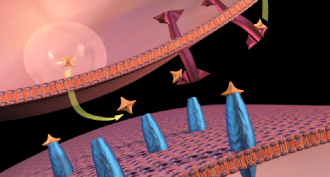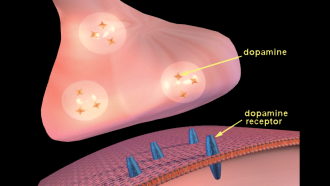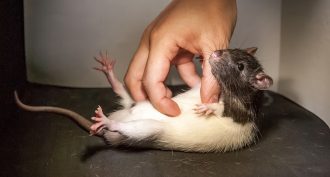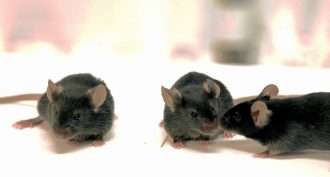Brain
-
 Health & Medicine
Health & MedicineBullying hurts — but peer support really helps
Bullied kids face more mental illness as adults, new studies find. Other research suggests support from other kids can lessen the impacts.
-
 Brain
BrainStuttering: Blood flow in the brain may play a role
A new study shows people who stutter have less blood flow to a language center in the brain known as Broca’s area.
By Lela Nargi -
 Brain
BrainExplainer: What is dopamine?
Dopamine is a chemical messenger that carries signals between brain cells. It also gets blamed for addiction. And a shortage of it gets blamed for symptoms of diseases such as Parkinson’s.
-
 Brain
BrainExplainer: What is neurotransmission?
When brain cells need to pass messages to one another, they use chemicals called neurotransmitters. This sharing of chemical secrets is known as neurotransmission.
-
 Science & Society
Science & SocietyDon’t let math stress you out
New research points to strategies for improving math performance in people who get stressed out by the numbers world.
By Evelyn Lamb -
 Animals
AnimalsAnimals can do ‘almost math’
Humans aren’t the only animals with a number sense. Scientists are trying to figure out where and when it evolved.
By Susan Milius -
 Brain
BrainTo reveal how the brain creates joy, start by tickling rats
Rats love a good tickle. Not only do they beg for more, but the action itself activates a part of the brain that detects touch, researchers find.
-
 Psychology
PsychologyWhat makes a pretty face?
Beautiful faces are symmetrical and average. Do we prefer them because this makes them easier for our brains to process?
-
 Brain
BrainLying sets up a liar’s brain to lie more
As people lie more, activity in one brain region falls, a new study finds. It’s an area associated with emotion.
-
 Health & Medicine
Health & MedicineZika birth defects: Concerns spread from head to toe
Zika infections may trigger problems well beyond babies born with small heads and brains. Scientists have begun linking a range of head-to-toe health ails to the virus.
By Meghan Rosen -
 Brain
BrainPain is contagious — at least in mice
Pain can move from one mouse to another. The trigger may be smell.
-
 Brain
BrainOut-of-whack body clock causes more than sleepiness
When the body’s “clock” doesn’t match the cues its getting from outside, people can feel bad. Researchers are using math to explain this “circadian-time sickness.”